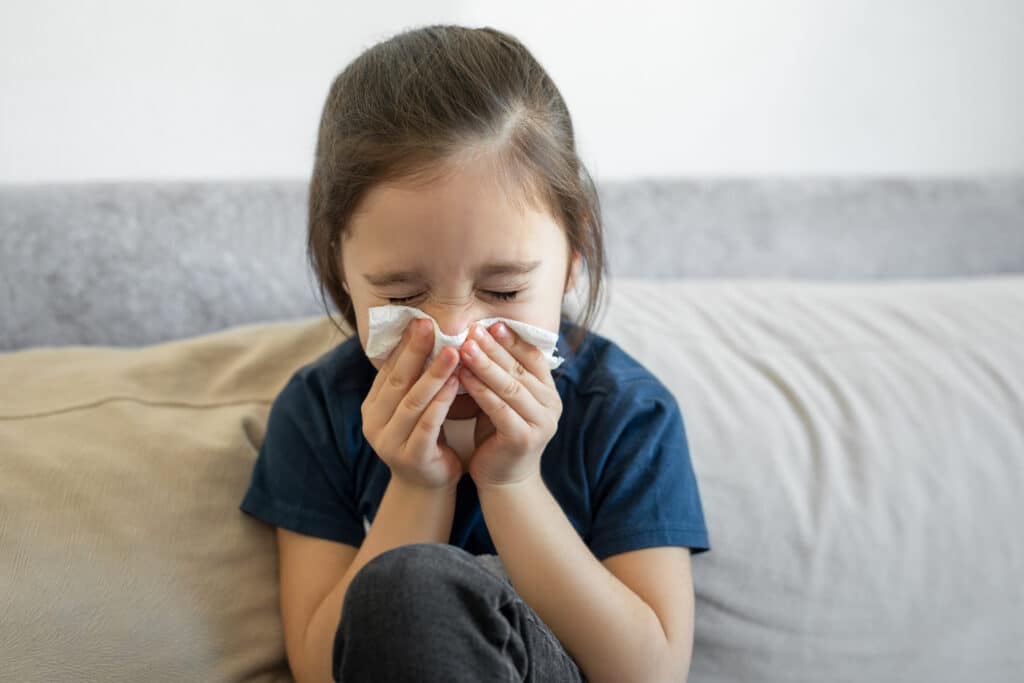Understanding Sinus Infections in Kids and Teens: Answers to Common Parent Questions
- Posted on: Nov 3 2025

Sinus infections, or sinusitis, are a common reason why children and teens feel run down, miss school, or struggle with congestion and headaches. While these infections often start as a simple cold, they can sometimes linger or lead to more serious complications if not treated properly.
At Sinus & Snoring Specialists, we help children and teens breathe easier, sleep better, and stay healthy year-round.
Below are answers to some of the most common questions parents ask about sinus infections in kids — including symptoms, treatment options, and when to see a doctor.
1. What are the common signs of a sinus infection in kids and teens?
It can be difficult to tell the difference between a cold and a sinus infection. Commonly, a sinus infection can develop from a cold. One of the more reliable indicators that this has happened is that symptoms of the cold, such as fever, thick yellow or green nasal discharge, and postnasal drip, last for more than 10 to 14 days. Older children will sometimes note headaches. Swelling and redness around the eyes, or conjunctivitis, are concerning for cases of advanced sinusitis. Fatigue is also a common complaint.
2. How long does a typical sinus infection last?
This can vary depending on whether the cause of the sinus infection is viral, bacterial, or fungal. These can sometimes be difficult to distinguish between at home.
Viral sinus infections are generally suspected when a child has had symptoms for 7-10 days. Often, symptoms can begin improving or even resolve after 10 days. Bacterial sinus infections usually persist for more than 10 days. Fungal sinus infections can last for weeks to months or longer.
3. Are there any specific treatments or remedies that can help relieve sinus infection symptoms?
In cases of viral sinusitis, addressing the symptoms is often helpful. Nasal saline rinses can be used to thin out mucus and improve nasal congestion and postnasal drip. Properly dosed Tylenol® or Motrin® can be used for facial pressure, headache, and fever. Over-the-counter nasal decongestants, such as Afrin®, can be used sparingly for severe nasal congestion, but should not be used for more than three days as they can damage the lining of the nose.
If symptoms don’t improve, your child may need to be seen by a medical professional.
4. When should my child see a doctor?
Generally, a medical evaluation is recommended when symptoms of sinus infections last for more than 10 days. Other reasons to seek care would be severe pain or a high fever.
On occasion, infections that begin in the sinuses can spread to nearby structures, like the eyes and the brain. This is called complicated sinusitis.
If the area around the eyes becomes affected, children may have swelling of the face or the eyelids, changes to vision, and redness of the eyes. If the area between the nose and brain is affected, they may have headaches, neck pain, and mental status changes. A quick medical evaluation would be appropriate.
5. How can sinus infections affect school performance and attendance?
Since they are a common cause of absences, persistent or repeated sinus infections can have a negative effect on school performance. The fatigue caused by the infection can also be a cause of poor performance. This can not only be due to the poor sleep and snoring that often accompany the sinus infections, but also due to the prolonged infection.
6. What are risk factors for sinus infections?
Children with allergies or asthma are more likely to get sinus infections. Other causes of nasal congestion, like nasal polyps (abnormal tissue in the nose due to long-lasting infections and allergies) and deviated nasal septum (the divider between the sides of the nose being bent to one side), can also cause the sinuses to drain improperly and lead to sinus infections. Having a weakened immune system from medications or other medical conditions is another risk.
7. What are the best ways to prevent sinus infections during the school year?
Taking care to manage allergies effectively is a good way to start. Many factors, including seasonal and weather changes, can result in worse allergy symptoms. Allergy medications can be used in the short term. Long-term care for allergies can involve immunotherapy, which involves slowly exposing the body to small amounts of the allergens over time.
Addressing other causes of nasal congestion (like a deviated nasal septum and nasal polyps) can also help prevent sinus infections. At Sinus & Snoring Specialists, we have significant experience with sinus disease and would be happy to guide you through your treatment options.
Next Steps for your child’s sinus relief
Sinus infections in children and teens are common, but they don’t have to disrupt your child’s health or school performance. By recognizing the symptoms early, managing allergies and congestion, and seeking timely medical care, parents can help prevent repeated infections and promote faster recovery.
If your child struggles with frequent sinus infections or ongoing nasal congestion, the team at Sinus & Snoring Specialists can help identify the underlying cause and offer effective, child-friendly treatment options.
Schedule a consultation today to get your child back to breathing freely and feeling their best.
📞/💬 Call / Securely Text (KLARA): 512-601-0303
🌐 Visit: www.sinussnoringent.com
Tagged with: Pediatric ENT, pediatric nasal congestions, Pediatric sinus, Sinus, Sinus infections
Posted in: Pediatric ENT, Sinus, Sinus and Nasal, Sinus Infection

